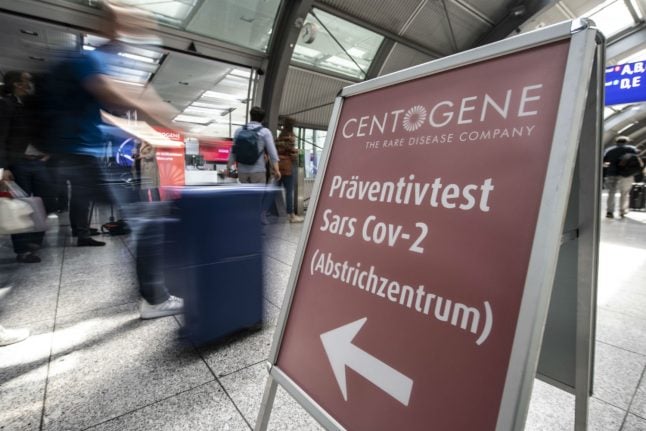Travellers returning to Germany from a “risk area”, as classified on a continually updated list from the Robert Koch Institute (RKI), need a negative coronavirus test. Otherwise they have to go into a domestic quarantine for 14 days.
Several airports throughout the country either offer these tests, or have plans to:
- There are currently tests available at airports in Frankfurt, Munich, and Cologne/Bonn.
- Free tests are also planned at all airports in Bavaria
- Berlin also intends to offer tests at its airports, but there are not yet plans in Hamburg and Düsseldorf
Here's what you need to know for each airport.
Berlin: Travel returnees from risk areas are expected to be tested for coronavirus at Berlin's airports from next week onwards.
This was announced by Mayor Michael Müller on Thursday: “We have been in talks with the airport company since last week and are currently coordinating where and when we will install the test stations for returnees from RKI risk countries in Tegel and Schönefeld,” said the SPD politician.
“Our goal is to be able to offer Covid-19 test stations there at the beginning of next week.”
Frankfurt airport: This airport paved the way in airport testing in Germany by opening the country's first walk-in testing centre in June – although an advanced registration is required.
READ ALSO: Walk-in coronavirus test centre opens at Frankfurt airport
The test is carried out via a throat swab, and must be paid for by the traveller: €59 for a result within six to eight hours or €139 for a result within three hours.
The test result is then displayed via mobile phone. For an extra charge of €9, returnees can receive an official valid proof of the test result which can be shown to authorities in various countries.
The testing centre is centrally located in the passage between Terminal 1 and the mainline railway station. More information is available on the airport website.
Munich and Bavaria: Holidaymakers can also have themselves tested for the coronavirus at Munich Airport. MediCare, a subsidiary of Flughafen München GmbH, offers such tests for around €190.
Anyone wishing to take a test must register by telephone (089/975-63399) via the airport's emergency ambulance.
The test results are available approximately four hours after the swabs have been taken. The test centre is located in the airport's medical centre (Terminal 1, Area E).
Bavaria is also planning on testing all holiday returnees at all airports in the southern state. The fees for this will be covered by the state or health insurance companies, but it is still unknown when the regulation will come into force.

A sign with hygienic measures at Munich's airport. Photo: DPA
READ ALSO: Bavaria plans free coronavirus tests to halt virus at border
Cologne/Bonn Airport also offers holiday returnees a test opportunity in a mobile laboratory for €90 (Monday to Friday from 7 a.m. to 5 p.m. and on weekends from 9 a.m. to 3 p.m.). The result is usually available within 24 hours. However, until the results are available, people returning from risk areas must go into domestic quarantine.
The test station is currently located outside the terminal on the parking deck opposite the ICE train station. In the next few days, though, it will move to a permanent station within the arrival terminal.
Where is there currently a travel warning?
For more than 160 countries outside the EU, the Federal Foreign Office has issued an initial travel warning until August 31st. For most European countries, it was lifted on June 15th and replaced by individual travel and security warnings for specific countries.
READ ALSO: Who is allowed to travel to Germany from outside the EU?
On the basis of various information, the Foreign Office decides how it assesses a danger situation and whether it advises against entering a coronavirus risk area:
How is a risk area determined?
The Robert Koch Institute (RKI) names three factors that can lead to the classification of a country as a risk area.
- If there are more than 50 new coronavirus infections per 100,000 inhabitants within seven days
- If there is insufficient testing capacity in a country or the measures to contain coronavirus are inadequate (e.g. hygiene regulations)
- When no reliable information is available for a particular country
Classification as a risk area is not the same as a travel warning. The travel warning can also be lifted for individual countries before August. If a country is classified as a risk area, however, this is pretty unlikely.



 Please whitelist us to continue reading.
Please whitelist us to continue reading.
I would guess that these tests are nasal swab tests… with results within 4 hours? That does not seem like a reliable test. While a positive result is probably accurate, a negative result may be meaningless: the person is just not making enough virus, the virus wasn’t in that part of the nose, etc.